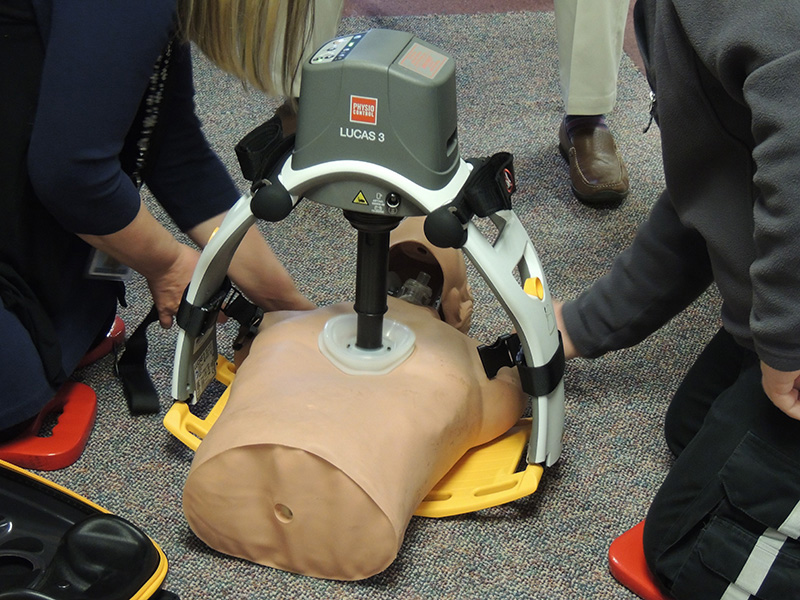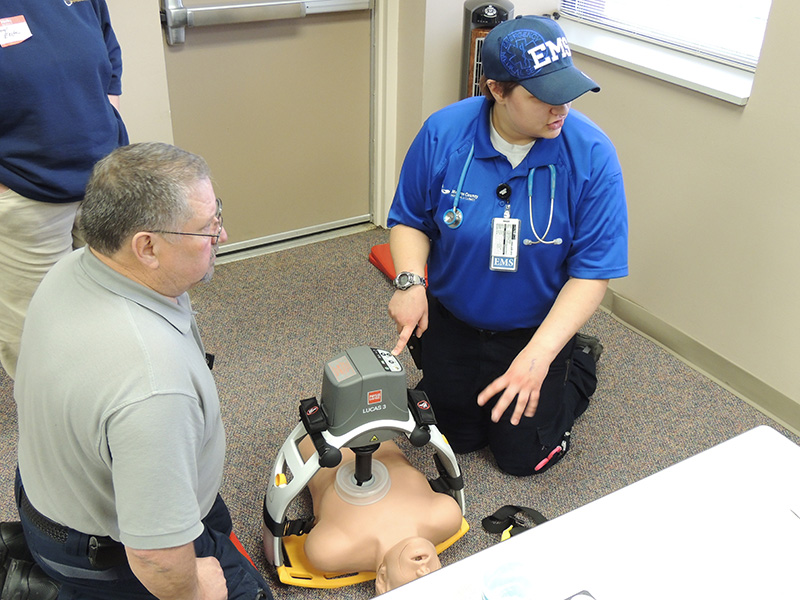

The Physio-Control LUCAS® 3 will benefit patients and rescuers by enabling continuous consistent chest compressions in cardiac resuscitations.
Albia, Iowa, April 3, 2018: Monroe County Hospital & Clinics (MCHC) will soon have an important lifesaving tool on board their vehicles. The emergency department recently announced the acquisition of 15+ Physio-Control LUCAS® 3 Chest Compression Systems.
From remote regions to the busiest metropolitan areas, the LUACS® 3 Chest Compression System has complemented rescuer efforts in saving sudden cardiac arrest victims in more than 80 countries.
MCHC hosted a 2-day Regional Training called Train the Trainer for the LUCAS® 3 Chest Compression System on April 3 and April 4, 2018. Licensed Medical Practitioner’s conducted training for over 35 attendees.
“We look forward to adding the Physio-Control LUCAS® 3 Chest Compression System to our operations,” said Gale Herrera, CNO, MCHC. “Both our patients and rescuers will benefit from this device’s unique abilities to provide lifesaving services efficiently and effectively.”
The LUCAS® 3 is a mechanical chest compression system that provides compressions at a rate and depth that are consistent with current American Heart Association (AHA) and European Resuscitation Council (ERC) guidelines for cardiopulmonary resuscitation (CPR). Both portable and quick to apply, the device works by providing continuous high-quality chest compressions which are critical to maintaining blood flow to save a sudden cardiac arrest patient’s brain, heart and vital organs. The LUCAS® 3 is battery-powered or can also be plugged into AC power for prolonged use. The device now also provides Bluetooth® connectivity for post event review of LUCAS® chest compression statistics, pauses, user modes and device alarms and alerts.
By providing consistent, high-quality chest compressions, the LUCAS® 3 can free up personnel to let them focus on other critical emergency patient care such as defibrillation, intubation, IV placement and transportation to a hospital. The LUCAS® 3 can also provide high-quality compressions in situations where manual CPR may be dangerous or challenging for providers, such as when performing CPR in a moving ambulance, in an angiography suite or on hypothermic patients.
Several studies show the effectiveness of manual chest compressions can drop rapidly – often after only one minute – due to rescuer fatigue. With LUCAS® 3, automated compressions are delivered consistently and continuously, helping to maintain good circulation to the patient during transport and throughout the hospital. In addition, LUCAS® 3 can continue to perform CPR during extended patient transports in remote, rural areas, allowing caregivers to be safely belted in their seats while in transit.
LUCAS® is the world’s most-used mechanical CPR device by installed base and is supported by the highest level of clinical evidence, with more than 99 percent of patients treated with LUCAS® having a good neurological outcome1 in one major study.
About Monroe County Hospital & Clinics
Monroe County Hospital & Clinics (MCHC) is a trusted provider of high quality, local health care to the residents of Monroe County, IA and surrounding. MCHC offers a comprehensive array of surgical, clinical, specialty, physical therapy, cardiac rehabilitation, occupational therapy, emergency services, and inpatient and outpatient services.
About Physio-Control
Physio-Control is part of the Stryker Corporation and is the world’ leading provider of professional emergency medical response solutions that predict or intervene in life-threatening emergencies. The company’s products include LIFEPAK® monitor/defibrillators, LIFEPAK® and HeartSine® automated external defibrillators, the LIFENEET® System, HealthEMS® electronic patient care reporting (ePCR) and fire department management software, LUCAS® 3 Chest Compression System, TrueCPR™ coaching device, and MCGrath® MAC EMS video laryngoscope.
1Rubertsson S., etal., The LINC Randomized Trial. JAMA. 2014 Jan 1;311(1):53-61.

